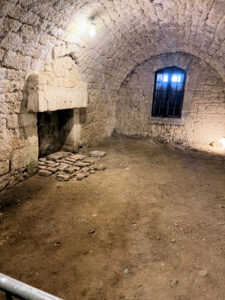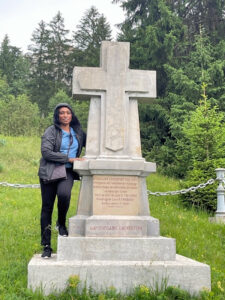For years, I refused to visit France, although I have many relatives living there. I did not want to visit a nation which had kidnapped and enslaved my African ancestors.
The slaves of France’s richest colony, Saint Domingue, spent 13 bloody years fighting for freedom from chattel slavery and colonial domination. They formalized their hard-won independence on Jan. 1, 1804. The bourgeoisies of Europe and the newly-born United States of America diplomatically shunned and economically embargoed the new upstart nation of Haiti because of the example it set for the slaves whom they still owned and trafficked.
Two decades later, in 1825, a French flotilla sailed into the Bay of Port-au-Prince to threaten Haitian President Jean-Pierre Boyer with annihilation unless Haiti paid 150 million gold francs in return for diplomatic recognition. Boyer bowed to the demand to reimburse the former colonists for their losses, and it took Haiti 122 years to pay off the onerous debt.

It was coincidental that in late May the New York Times published a series on Haiti’s “independence ransom,” a month before I finally decided to travel to France.
Coming of age during the crises of AIDS and “boat-people”
Growing up in New Jersey, I was ashamed to be Haitian. My elementary school classmates used to tease me because I spoke another language at home and had a different upbringing. In high school, there were only 15 Haitians in a student body of 400, and I was the only Haitian in my class.
This was during the late 1980s and early 1990s, when the headlines were filled with negative press about Haitians bearing HIV/AIDS and arriving as “boat-people.” As a result, Haitian students in my school were often bullied, while teachers looked the other way. To acculturate with the other students, I sometimes denied that I was Haitian.
As a college student, however, I began to better understand Haiti’s history and politics, as well as the world. At Montclair State University, I majored in political science, learning new concepts and expanding my horizons. As I met students from around the globe who embraced their cultural identities, I had an epiphany, realizing that I should be proud of my great-great-grandparents for the sacrifices they made to destroy the institution of slavery so that I could be attending college in New Jersey.

I joined many clubs in college, including the Haitian Student Association. Its mission was to promote respect and a better understanding of Haitian history and cultural traditions, which helped me to piece together some of the misinformation I had been fed about Haiti.
The Haitian club’s student advisor was a tenured biology professor who did a remarkable presentation on Haiti before an audience of over 1,000 students, debunking the Center for Disease Control’s accusation that Haitians were a vector for the transmission of HIV/AIDS. There were five countries with the highest HIV/AIDS rates, and the U.S., not Haiti, was one of them. The percentage of Haitians contracting HIV/AIDS was insignificant compared to many countries in Africa, North and South America, Europe, and Asia. The presentation inspired me to do more research. I read many books about Haiti and the U.S. military interventions there in 1915 and 1994.
The scholarly articles and books that I read all painted a similar picture of Haiti’s government: that it was corrupt, unstable, and needed U.S. intervention to function properly. I was frustrated at the dangerous stereotypes presented and the failure of writers to address the root cause of Haiti’s despair.
Media accounts were particularly annoying, usually leaving out important facts. The opening line was always that “Haiti is the poorest country in the Western Hemisphere.” The second sentence would focus on corruption, but, again, the reporters rarely bothered to research and present the exploitation and oppression responsible for Haiti’s deep poverty, lack of infrastructure, and environmental disaster.
The “independence debt” makes prime-time
The New York Times series on Haiti’s “independence debt” finally brought the issue of reparations for Haiti into the mainstream discussion, even though the paper still needs to recognize its own culpability for publishing racist and imperialist narratives about Haiti, which whitewash the U.S. role in impoverishing the country. The colonizers try to have colonized people think that slavery and the “independence debt” have nothing to do with Haiti’s current economic crisis.
Haitian intellectuals have long sought to explain this dynamic, but it has fallen on deaf ears. On Democracy Now, Professor Westenley Alcenat explained how he has written extensively about the “independence debt,” but the issue was not recognized as important by the mainstream until the New York Times addressed it.
The Haitian Revolution threatened the economic interests of colonizing nations. The idea of slaves overthrowing their French masters and governing themselves was incomprehensible to President Thomas Jefferson. Haiti’s birth shook the existing world order, so Jefferson and his successors made sure to isolate Haiti diplomatically and economically, taking 58 years to recognize it as an independent state.

It is fine that the New York Times and other mainstream media are now discussing and bemoaning the ransom Haitians paid to France from 1825 to 1947 after liberating themselves. But the question remains: Where are the restitution and reparation payments for my ancestors’ years of suffering? While French families became very wealthy, Haiti experienced negative economic growth as my ancestors had to borrow money to pay the ransom. Slavery and the ransom helped pay for iconic French monuments like the Eiffel Tower. The Haitian government could not afford to build roads and bridges, sewers, and water pipes let alone building adequate schools for every child to attend. No other nation had to pay an indemnity for liberating themselves from slavery. Haiti wants its restitution payment.
The more I read about Haiti’s history, the more I resented France. Finally, my late uncle, who was a bishop in Haiti, convinced me to visit France to better understand history and, of course, to visit my many relatives living there.
Toussaint L’Ouverture’s legacy in France
Due to my life experience, the highlight of my trip to France in June 2022 was visiting Fort de Joux, where my hero, General Toussaint L’Ouverture, died on Apr. 7, 1803. The fortress was originally a castle named Château de Joux, situated on the Swiss border. Toussaint was brought to Fort de Joux on Aug. 23, 1802 and survived for only seven months, due harsh conditions and mistreatment.
In the French colony Saint Domingue, French officers of Napoleon’s army lured Toussaint to a meeting where they arrested him then quickly loaded him onto a ship to France. He prophetically warned them that the kidnapping would backfire.
I wanted to re-imagine what it was like for a black man from the tropics to be held captive by racist, white guards in a cold, dark room where one could not differentiate day from night. The doctor who examined Toussaint’s corpse declared he died of apoplexy and pneumonia. The French government threw his body into an unmarked grave in the forest, not too far from Château de Joux.
As I traveled the roads to Château de Joux, I could imagine that night when the French army brought Toussaint there with his hands and feet shackled, a sack covering his head, clothes torn, struggling to walk and breathe while heavily armed soldiers whipped him.
In 1802, a 59-year-old was considered an elderly man, but his captors were heartless and treated him inhumanely. He was malnourished, receiving only rations of dry biscuits, sugar, and coffee, and, every now and then, some cheese. The army kept him in a heavily-guarded rock dungeon without any light for almost 24 hours each day.
How could he escape in these high mountains where he had no allies? He didn’t know the alien terrain. Château de Joux is surrounded by a large forest, and during the 18th and 19th centuries, it served as a prison for anyone threatening public safety or the state.
In 1034, Château de Joux was built and repeatedly remodeled for military defense against foreign invasions. In the 16th century, the military base became strategically important, as it sat on a military highway used to control and defend the French border.
After WWII, Château de Joux lost its strategic military importance, and in 1954, it was opened to visitors. Château de Joux, which overlooks the Jura Mountains, was sold to the Pontarlier-La Cluse and Mijoux municipalities, which later merged with the Pontarlier village, and now the town of Pontarlier is called the Grand Pontarlier District Council. Since 1996, the Château has been registered as an historic monument.
To attract visitors, the municipality uses the Toussaint L’Ouverture memorial site and cell to generate tourism and pilgrimages which help pay for the upkeep of the Château. The building is now over 1,000 years old. Toussaint’s remains have been moved to a grave site with a cross outside Fort de Joux, now a museum.
I am glad that the French government nominally recognizes Toussaint as a martyr and Haiti as a beacon for freedom. It is good that it uses Fort de Joux to educate the public, but Haiti also needs restitution of the ransom extracted from it, which caused so much suffering and economic deprivation since its birth 218 years ago.

France’s lip-service to Haiti also helps to confuse Haitians, appeasing and neutralizing their outrage. For example, my cousin in France argues that the French have helped Haiti but don’t publicize it. He further states that France holds many cultural events in honor of Toussaint L’Ouverture, and that there are streets and buildings in Paris named after Toussaint.
Such symbolic gestures are not enough. My ancestors worked day and night, and often died, to supply the coffee, sugar, and indigo that built and supported the French aristocracy’s wealth and lifestyle. France’s debt is not just moral but also monetary. Haitians want reparations for slavery and restitution of the “independence ransom” so they can build proper housing, schools, sewers, water systems, electrical grids, hospitals, and other infrastructure.
What France must do
Despite my cousin’s conciliatory attitude, I, like many Haitians, have questions. How has France significantly assisted Haiti, other than some token development or road projects? Has France educated its citizens about the ransom payment? Has it apologized for its role, now admitted by its ambassador, in the 2004 coup against President Aristide? Has France put its historical crimes of slavery, colonialism, and fomenting coups d’état into the curriculum of its young students?
Napoleon thought by getting rid of General Toussaint L’Ouverture, he could roll-back the slave revolution. Instead, the Saint Domingue revolt became his greatest defeat. He had to sell the vast Louisiana Territory to the U.S. so he could finance his wars in Europe, but Haiti had already mortally wounded his ambitions and plans.
The French government took part in the 2004 coup d’etat against former President Jean Bertrand Aristide because he demanded a $21.7 billion financial restitution from France in 2003. Haiti’s demand inspired all of CARICOM to also demand reparations from Europe.
Haitians want the French, the U.S., and Canada out of Haiti. They are throttling Haiti’s progress and self-determination. I believe that most Haitians are like me. When they truly understand their history, they are indignant and motivated to fight for social change and revolution.
Toussaint’s famous last words as he was snatched from Saint Domingue in 1802 were: “By overthrowing me, only the trunk of the tree of freedom of the black has been cut down in Saint Domingue. It will grow back because its roots are numerous and deep.” Haitians have never forgotten these words nor Toussaint’s sacrifice. We will continue to struggle for justice for the crimes of France and the U.S. against the Haitian nation, above all for restitution of the “independence debt.”










